Interview with Anna Smith Spark (EMPIRES OF DUST)
Anna Smith Spark is the author of the critically acclaimed grimdark epic fantasy trilogy Empires of Dust. The David Gemmell Awards shortlisted The Court of Broken Knives is out now with HarperVoyager/Orbit; The Tower of Living and Dying will be published August 2018.
Anna lives in London, UK. She loves grimdark and epic fantasy and historical military fiction. Anna has a BA in Classics, an MA in history and a PhD in English Literature. She has previously been published in the Fortean Times and the poetry website www.greatworks.org. Previous jobs include petty bureaucrat, English teacher and fetish model.
Anna’s favourite authors and key influences are R. Scott Bakker, Steve Erikson, M. John Harrison, Ursula Le Guin, Mary Stewart and Mary Renault. She spent several years as an obsessive D&D player. She can often be spotted at sff conventions wearing very unusual shoes.
Welcome back, Anna! I don’t think we’ve had the chance to interview you since your third book came out – how does it feel to have a completed trilogy out there in the world?
Strange. In some ways, very sad – it’s over, ended, forgotten dust in the wind … I personally feel very hollowed out by having ended it. I’ve lived with that world and those characters all my life, I poured out everything I love and loathe about … everything, really, into the trilogy, and now it’s done and over. I lived in that world more vividly than I lived in the real world, and now I don’t live there anymore.
But also a profound satisfaction. I’m intensely proud of what I achieved in Empires of Dust, there are some passages that make the hair stand up on the back of my neck when I think, ‘I wrote that’. If I never publish another book in my life, I’ll feel deep satisfaction with what I achieved with the trilogy.
You should be very proud of it! It’s an incredible trilogy!
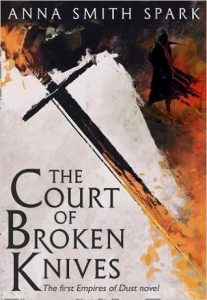 I know you’ve often said you didn’t realise you were writing a novel when you wrote Court of Broken Knives, so was it a bit of a shock to be writing a trilogy? When did you realise you were, and how did you approach concluding a trilogy that you didn’t intentionally start?
I know you’ve often said you didn’t realise you were writing a novel when you wrote Court of Broken Knives, so was it a bit of a shock to be writing a trilogy? When did you realise you were, and how did you approach concluding a trilogy that you didn’t intentionally start?
Yeah – I was writing away for a good 50,000 words before it was clear I was writing anything, and it took the entire first book really to understand what the story was. But as soon as I did realise what it was I was writing and who Marith was, the whole story right up to the end came into my head. The second to last chapter of the whole trilogy was actually written early on, while I was still finalising Broken Knives. The trilogy is the classic Tolkienesque one novel in three volumes (I’m sure I have Goodreads reviews of The House of Sacrifice complaining that it doesn’t make sense as a standalone – no, it doesn’t.) The real challenge in fact, knowing the end so well, was giving The House of Sacrifice the space to exist as a full-length novel, not just charging to the end that I already had clear or writing 120,000 words of foreshadowing and nothing else.
Over the course of the trilogy which has been the toughest aspect of writing? Is it the plot, characters, dialogue or action scenes?
Hmmm… Honestly, the whole thing either works or it doesn’t. Some days I’ll write two hundred words in eight hours, have no idea what I’m trying to say, rewrite one line of dialogue (‘Hello,’ she said) ten times and know it’s totally wrong, feel itchy and uncomfortable. Then two days later when I’m reading before bed I’ll see everything that I’m supposed to write, know exactly what’s wrong and what should be happening. If the plot is slightly wrong, the dialogue won’t be right either, the prose just won’t work, I’ll feel it physically and mentally. Once I have that realisation of what I’m supposed to be doing it all flows properly together.
Plot is I suppose the thing I have the least interest in. The story, as in the themes, the ideas, the reasons the characters have for being where they are interacting the way they do, is obviously huge and sets the whole thing in motion. But the ins and outs of the plot are not something I think about as much as I do the characters, the prose, the settings. The plot of Empires of Dust is very simple. I’m not a huge one for multiple plot twists.
If the Empires of Dust series was adapted to the big or small screen, who would you ideally cast for the main characters?
Oohh…. I would actually be very reticent about a screen adaptation of Empires of Dust unless it was done really beautifully and thoughtfully in the style of Lynch’s Dune (the best SFF film ever made, way better than the book, visually and aurally sumptuous). And I can see all kinds of ‘interesting’ casting choices being made: ‘We’ve got this hot new blonde starlet, she’d be great for Thalia, and maybe Henry Cavil for Orhan, also maybe Orhan and Darath could be, like, cousins, instead …’
That is absolutely what someone would suggest – now I can’t unsee it and regret asking you this question…
And I bet they’d make Landra and Tobias get it on at one point in season two. Noooo!!!!!
However, I do obviously think about what the big budget Lynch adaptation would look like.
Marith – it would have to be an unknown newcomer. Marith is such a blank canvas right at the beginning. What a terrible job it would be, searching out new talent for that role …
Thalia – Lexi Underwood.
Orhan – Chadwick Boseman.
Darath – Michael B Jordan. No, it’s probably not very imaginative choosing the Black Panther dream team … but all my Black Panther slash fantasies would come true and that would be a fine fine thing.
Tobias – Tobias Santelmann (Born for it!!! His parents just knew!!! [The character was not named after him, by the way. I have no idea where the name came from]).
Landra – Freya Allen.
I have to confess I don’t watch my television and don’t go to the cinema at all. So I’m not very au fait with up and coming actors at all.
You’ve often discussed in the past how Aspergers, dyslexia, and dyspraxia have all impacted your writing, but have they influenced your writing in any positive ways? Do you feel you have an outlook that others might not consider in their own writing? Also, what advice would you give to any authors wishing to write more diversely and include characters with Aspergers and dyspraxia in their works?
I don’t think I’d be able to write at all without my Asperger’s, or at least nothing remotely resembling the books I have written. The way my brain works is a curse for some things, a blessing for others (so no different to anyone’s brain or body) – I can see the whole book in my head, even the bits I haven’t written, I know exactly where the characters all are, how different timelines interact, patterns like several fast scenes then a slow one, repetitions of imagery and then variations on that … when the book is working, I see it all almost like looking at a painting. Not the individual words but the shape. I have no idea whether this just a pretentious way of describing what all authors experience, obviously, but I’m beginning to suspect it isn’t. I had a sudden horrible realisation a while ago that it might be my Asperger’s thing. Like being able to recite pi to 15,000 digits. I met a guy years ago who could do that, he saw it and experienced it synesthetically. I now remember his description of ‘walking through pi’ and realise that I may do something similar with my books. Which possibly also explains why I feel so ill when it’s not working.
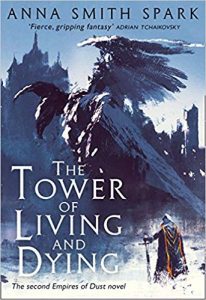 I sometimes wonder if I’d give up being Asperger’s. I suspected I’d be a lot happier generally but less ecstatic occasionally.
I sometimes wonder if I’d give up being Asperger’s. I suspected I’d be a lot happier generally but less ecstatic occasionally.
A person who’s written an Asperger’s character really well is John Gwynne. Drem in A Time of Dread is on the spectrum (I asked John) – or rather would be diagnosed as such in a world with diagnostic tests for neuroatypicality. He has personality quirks (again, like we all do) that are right for Asperger’s, he counts his pulse obsessively, he has real issues with people saying something factually wrong, he finds cities difficult to cope with because of the sensory overload. But he’s not defined by his Asperger’s, it doesn’t bother him or upset him, his father never tells him he’s weird or a failure. There’s a lovely scene where his father tries without being critical to stop him correcting a bad guy with a sword who’s factually wrong on a technical point and Drem just can’t get why (‘but he’s wrong dad, how can I let him go around being wrong?’) that I love.
I can’t really say much more than that (I have no real idea how my brain is different, to be honest. I’m just told or realise in staff meetings that it is). Write people with different quirks and personalities, and be sympathetic to all of them. And think about your friends – you almost certainly know people who are on the spectrum – think about them when you write.
The only thing I would say as an iron rule, and it should by now be unnecessary to say it, is that the parents of children with Asperger’s or any disability don’t actually tend to hate and disown their children, rule them out of the succession, wish them dead, and we don’t tend to grow up bitter and twisted at the world with a burning desire to betray our kingdom to the Dark Lord as a result. Nor do we often at the last choose to nobly sacrifice ourselves to save said kingdom, having finally reconciled ourselves to accepting that what our parents did was for the best.
Thank you for such an insightful answer Anna. We really do need to stop using disabilities as plot points!
You have the most impressive range of shoes, Anna! Ok just because we’re cruel: there’s a disaster and you can only save three pairs, which three do you choose! (Feel free to send us pics of them!)
I am mourning good shoe wearing opportunities. The first time I have a reason to wear my shoes again will be a great day. I’ll be hobbling around the park with my kids wearing them soon at this rate.
It’s a tough choice, but the three most beloved are:
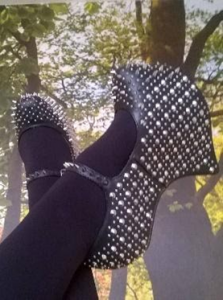 The Shoes of Broken Knives, forged from the shattered blades of my enemies. The most adored of all my shoes, and also the least worn because they’re so heavy I can’t pack then if I’m travelling by plane or train.
The Shoes of Broken Knives, forged from the shattered blades of my enemies. The most adored of all my shoes, and also the least worn because they’re so heavy I can’t pack then if I’m travelling by plane or train.
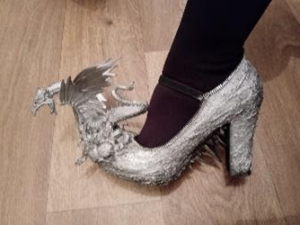 The Dragon Shoes, my gift to myself to celebrate being invited to be a guest at GenCon last year. Actually very comfortable, although it’s physically impossible to walk up a flight of stairs wearing them.
The Dragon Shoes, my gift to myself to celebrate being invited to be a guest at GenCon last year. Actually very comfortable, although it’s physically impossible to walk up a flight of stairs wearing them.
 Cake Shoes! Sadly not wearable, nor indeed actually owed by me, but Andrew Wallace found this picture for me and it’s just perfect.
Cake Shoes! Sadly not wearable, nor indeed actually owed by me, but Andrew Wallace found this picture for me and it’s just perfect.
Challenge accepted Anna!
Since this is our Women in SFF month, who were the women in SFF (or beyond) that influenced or inspired you? (Authors and/or characters!)
As I child, I read everything by Rosemary Sutcliff and Susan Cooper, both of which helped shaped my love of fantasy and folklore. Sutcliff’s novel about Boudica, Song for a Dark Queen, is still very vivid in my memory. And I loved Cooper’s Greenwitch, which raises all kinds of very interesting points about female power and magic, opposes female plurality and compassion with traditional High Magic Men of Power Who Have Rules and Demand Things. That very much stuck with me.
Reading Narnia, I admit that I was always kind of on the side of the White Witch for similar reasons – the misogynistic way Lewis wrote her is pretty explicit about female power and male fear of it and I was aware of that very young without really being able to articulate it. Tiamat in the awful Dungeons and Dragons cartoon is a very early memory for similar reasons – the only thing the male powers are afraid of is a chaotic untameable multiheaded* lady dragon? Hell yeah!
*The men have swords that they can use to penetrate once and then it’s over. Tiamat has multiple open mouths that just keep going on and on … Just saying.
What’s a good SFF work (written by a woman) you’ve read recently?
I was sent an ARC of Northern Wrath by Thilde Kold Holdt. It’s a big, muscular, savage Norse fantasy set during the last days of the old pagan Viking chieftains. There’s a great scene where people are muttering about the old days, when people could go raiding properly, how it’s all not like it was. It really gets into the weirdness and alienness of pagan culture very well, and it has some beautiful prose. The heroine, Hilda is awesome.
I have to admit, though, I’ve been doing a lot of favourite old classics comfort rereadings recently. Moorcock, Renault … I need to read stuff that’s familiar and takes me back to before everything.
I’m hugely looking forward to Lucy Hounsom’s Sistersong (spring 2021), which is a feminist reimagining of an English folksong set in Arthurian-age Devon. Several of the things I love most in the world are combined there, and I know Lucy will make it strange, beautiful and complex.
I’ll never forget your description of a dragon in The Court of Broken Knives: Deep fetid marsh rot snot shit filth green. Could you apply your poetic license to another mythological creature for us?
Argh! No! I’m tired!!! I’ve spent the whole weekend organising a formal protest against the idea of a Saudi Arabian WorldCon and now I’m shattered. I will, however, share the one triumph of homeschooling (see footnote two below), my son’s haiku about a cat:
The Cat
He yowes so loudly
His eyes are golden and bright
And his fur so soft.
Perfect – how wonderful to have another poet in your house!
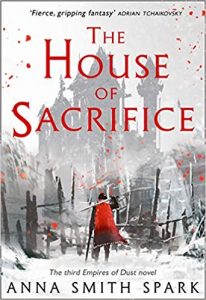 Your Empires of Dust was heavily influenced by the classics, with Marith modelled on Alexander the Great; can we expect more from you in future similarly influenced? I’ve seen you’re also homeschooling at the moment – free time? Oh you mean 1am, right? – but are you currently working on anything new?
Your Empires of Dust was heavily influenced by the classics, with Marith modelled on Alexander the Great; can we expect more from you in future similarly influenced? I’ve seen you’re also homeschooling at the moment – free time? Oh you mean 1am, right? – but are you currently working on anything new?
Yeah, the homeschooling** has been so great. The impact on women has been disproportionate, depressing, inevitable … It has stopped my writing, yes. I’m too shattered to speak after homeschooling all day.
I have a story out soon in Grimbold Books’ Lost Gods anthology about selkies, based on folktales and set in the White Isles/the far west of Cornwall (the footpath the characters take in the story is based on the walk between the Gurnard’s Head and Zennor, where mermaids are said to live). It’s a feminist post #metoo reading of the selkie myth that explores motherhood in a society that doesn’t recognise female sexual consent (i.e. until very recently most of them). I’m extremely proud of it. And I am writing a new novel, but that’s under wraps for a while yet. It does have a classical Greek literary and historical influence as well, though, because that’s what I love to write.
I thought about writing a historical novel set in ancient Greece, actually, but it’s way more fun to make stuff up. Also: dragons.
** ‘Homeschooling’ – foreign word, possibly Orcish in origin, that roughly translates as ‘screaming at your children for three hours to do something, giving up and letting them play Minecraft because it’s marginally better for their brains than watching Dangermouse, weeping with guilt in the bathroom for an hour, a brief moment of triumph when they repeat the two times table for their body weight in chocolate, more shouting and weeping, going to bed at 8pm with a bottle of gin’. – This is disturbingly familiar. Substitute gin for rum and it’s absolutely my household too (Beth)
So pleased to hear we can expect selkies and dragons from you!
Lastly, here’s a fun one for you, Anna! You are reborn in a world of magic, wyverns and–dare we say it?—mazes. You have, however, retained your knowledge of the modern world, and have enough encyclopedias in your head to transform society – will you do it, for the betterment of all? Or…Will you embrace your inner villain and use the knowledge for nefarious purposes?
Ha ha! My mum has always dreamed about being a benevolent dictator. She’d totally sort poverty, gender discrimination, lack of educational opportunities and healthcare, pollution, all that. And anyone who objected to such benefits would be educated out of their mistakes …
I’d love to say I’d leave notes lying around saying things like ‘washing your hands before amputating a gangrenous limb or delivering a baby might be a good idea’, ‘seriously, making a pact with the Dark One in exchange for your sister/father/partner’s life is never a good idea, trust me on that’, ‘ATHEISM AND FREE WILL, CHAPS, IT’S THE FUTURE!’ But all power corrupts and I suspect all knowledge does too.
Vaguely relevant here: there’s a convincing argument that the Greeks and certainly the Romans could have developed mechanised steam technology, but didn’t because it was cheaper and easier to carry on using huge quantities of slaves rather than automate. I find this horrifyingly persuasive. I can imagine myself in a fantasy world shouting about wind turbines and the local ruler saying they’re not interested.
Dragon-powered electricity stations, though …. We could bypass the whole oil catastrophe and go straight to hydroelectric. Unless … does dragon fire produce CO2??? Would I need to use my knowledge to develop carbon-offsetting? How do we balance dragon rights with climate meltdown? Shit.
We’ll leave you to ponder out the specifics… Thanks so much for joining us, Anna!
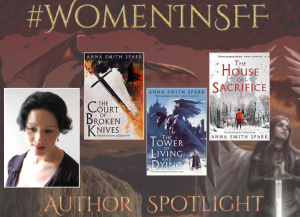

[…] the world at large and in your writing since you were talking to Mike Everest Evans back in September 2018, so there’s lots to catch up on. We’ll start by looking at your upcoming release of A Woman of […]